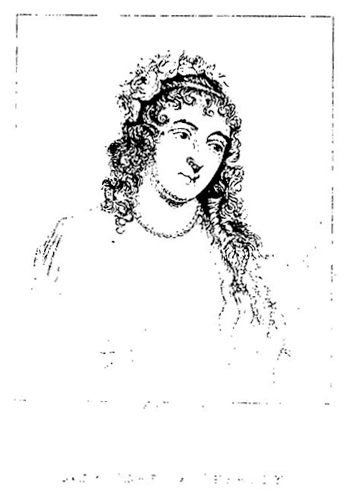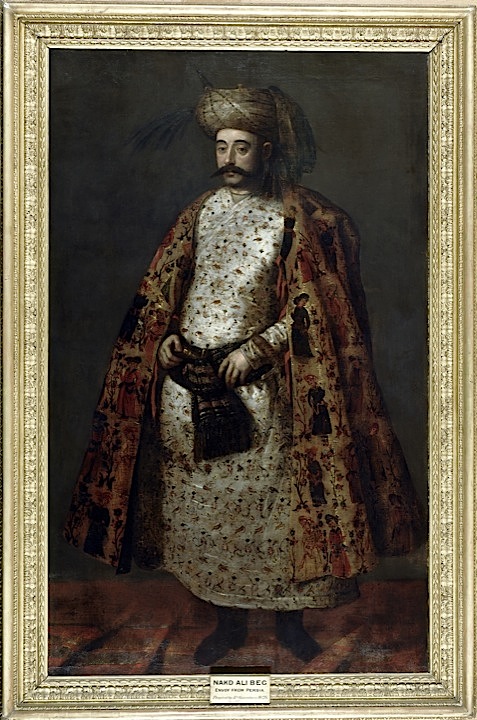Excerpts from
Shirley, Evelyn Philip. The Sherley brothers, an historical memoir of the lives of Sir Thomas Sherley, Sir Anthony Sherley, and Sir Robert Sherley, knights (1848). Retrieved from Archive.Org 05/04/2014
That Robert Sherley had attained a competent knowledge of the Persian language is also apparent from the second letter; His patience, it was many years afterwards stated by Herbert, was better than his intellect, he was not much acquainted with the Muses, but what he wanted in philosophy, he supplied in languages. [P 59]
The period of Robert Sherley’s marriage is not exactly known; that event must however have taken place previous to 1607, as it is recorded in Nixon’s pamphlet printed in that year, though not without considerable ex- aggerations and inventions. The lady was Teresia, the daughter of Ismael Khan, a Circassian of noble birth, and Christian faith. She was, on the authority of her husband, related to one of the Circassian wives of King Abbas, and is honourably mentioned by Herbert as “the thrice worthy and undaunted Lady Teresia;” according to Nixon, two children were the issue of this marriage, born in Persia, to one of whom the King stood godfather [P 59]
About the middle of March, 1610-11, the Lady Teresia Sherley joined her husband; she had landed in February at Lisbon from Hamburgh, her lodging was appointed by order of the King of Spain in the Monastery of English Nuns, but through some misunderstanding with the Collator of the Pope, she was not received there, and while she remained at Lisbon, resided “in a very fair house which she hired by order of Sir Robert.” [P 75]
Sir Robert and his wife left Madrid the beginning of June, 1611; on the road, three days’ journey from that city, they met Sir John Digby, who was on his way to replace Mr. Cottington as Ambassador at the Court of Spain. They traveled by way of Bayonne in France, but the time of their arrival in England, I do not find exactly noted; in August, however, they were certainly at the paternal seat at Wiston, and a sorrowful meeting must it have been to the whole family, notwithstanding the extraordinary honours with which the youngest son returned invested, and the novel circumstance of a Persian wife. Sir Thomas Sherley the father was still living, but broken both in health and fortune; he had never been able to repay the vast debts which his former extravagance had occasioned, and having in vain attempted to recruit his exhausted patrimony by farming various Patent offices granted him by the Crown, was in the utmost extremity of distress. His eldest son, Sir Thomas Sherley the younger, was also in trouble; released as we have seen from Turkish slavery by the mediation of his Sovereign in 1605, he passed some time travelling in Italy and Germany, and returned to England the latter part of the year 1606; in September, 1607, he was arrested on a charge of interfering with the Levant trade, and committed to the Tower. His imprisonment, however, was of short duration, and after answering certain queries relating to a supposed plot connected with the trade of Turkey, the particulars of which are preserved in the State Paper Office, he was discharged, hut only to grapple with the still greater difficulties of poverty and distress; he was no doubt deeply involved in his father’s liabilities, and at the time of his brother’s arrival in England appears to have been prisoner in the King’s Bench for debt. [Pp 75-76]
The birth of the first born and only son of Sir Robert Sherley in the autumn of 1611, was a circumstance which added to the interest with which his Embassy was regarded; the Lady Teresia, of noble Circassian lineage, was perhaps the first of her nation who had visited England; she had been married several years without issue, this fact appears to be alluded to in a curious portrait of this remarkable person, in my possession; the painting is on panel, and exquisitely finished, the dress ornamented with a pattern com- posed of suns (the emblem of Persia,) and flowers, her hair also ornamented with a chaplet of flowers, the features by no means handsome, although she has been described as a great beauty. To the right of the head is the representation of a labyrinth with the motto “concessit gratia filum.” The last word may be read Jilium, and applies no doubt to the birth of the little “Henry,” as by the Prince of Wales, who condescended with the Queen to stand sponsors, the infant was named. Sir Robert’s letter to the Prince on this occasion is preserved in the Harleian Collection, and is as follows.
“Most renownede Prince. The great honnors and favors it hathe pleased your highnes to use towards me, hathe imbowldede me to wright thes fewe lyns, which shal be to beseeche your highness to Cristen a son which God hathe given me. Yourhighnes in this shal make your servant happy, whos whole londginge is to doe your highnes som segnniolated servis, worthy to bee steemed in your Prinsly brestt. I have not the pen of Sissero, yett wontt I not means to sownde your highnesses worthy prayses in to the ears of forran nattions, and migtey Prinses; and I assure myselfe, your highborne sperritt thirstes after fame, the period of greate Prinses ambissions; and further, I will ever be your highnes’ most humbele and observant servant. Robert ShERLEY.”[Pp 78-79]
Between eight and nine months were occupied in this voyage, for Captain Newport, after vainly endeavouring to land the Ambassador in the Gulph of Persia, and narrowly escaping a treacherous attack of a revolted Persian Prince at Godel, (Guadal,) arrived in the Sinda or Indus about the month of September, 1613. Purchas gives a particular account of the dangers they escaped on the coast of Cutch, which appears to have been confounded with Guadal above referred to. The crew are said to have recovered Sir Robert and Lady Sherley’s luggage, which had been sent on shore, by the following ingenious device, they filled with stones the four State Chamber Vases, being, as the Captain describes, “of goodly exterior,” and landed them in a boat, as treasure, and placed them with the luggage; when on the point of departure, the Captain, who received his instructions from Nazer Begg, an attendant of Sir Robert’s, pretending to have forgotten something, ordered the sailors to take up Sir Robert and the lady’s boxes, on the plea that Lady Sherley had desired him to bring back her luggage as she required clean linen, and that it would be returned on the morrow they thus recovered all the Ambassador’s effects safe on board, leaving the natives to investigate the contents of the vases. [Pp 82-83]
It was during this second visit to Rome, in the Pontificate of Gregory XV. that both Sir Robert and his wife were painted by Vandyke, then a young man in the service of Cardinal Bentivoglio; these portraits, whole length, and in the Persian costume, are still preserved at Petworth. [P 88]
“Sir Robert Sherley with his Persian wife is come hither again out of the clouds I think, for I cannot learn where he hath been all this while, but he requires audience in quality of an Ambassador, which I hear is granted him at Newmarket, because he lies not far off at his Sister’s the Lady Crofts,”‘ which is the best retreat and means he hath here.”[P 88]
This was the arrival of Najdi Beg [Nukud Aly Beg], a Persian nobleman who had been appointed through, intrigues of the East India Company, Ambassador from Shah Abbas, evidently for the purpose of disgracing the long tried and faithful representative of the King of Persia. [P 94]
Petition “To the right honorable the Lords of his Majesty’s most honorable Prevy Councell.
“The humble Petition of the Lady Teresia Sherly. “The Brutish disgrace done unto Counte Sherlye Ambassider from the Kinge of Pertia; unto this State, my Lord & husband, by the hand of that Barbarous Heathen, who stileth himself Ambassodor, likewise from that Kinge, beinge duely considered, & that they are both to embarque in one fleet of shipps nowe goeing for Pertia; with the confusion that may happen in the voiage; amongest the whole company unlesse provision be used, your honor will I hope heare & pdon it, yf the feares of a woman cause her to trouble yo’ Lords with this humble Petition.
“That a Mandamus may be directed unto the generall and Captaynes of every Shipp, commanding them not to suffer the said two Ambassadors, to goe on shore, both at one tyme togither, untill they arrive by the devine pmission at Pertia; & that at euery watering place wher men goe on Land to refresh themselves by the waye, my Lord maye have at least as much tyme allotted for himselfe as the other, who hath noe women amongst his Traine, which ys the some of this her humble request, & shee shall alwaies praye &c.” [P 95]
Of the “thrice worthy and undaunted Lady Teresia, the faithful wife of Sir Robert Sherley,” Herbert has also preserved some particulars; he tells us how when her husband lay dead by her, and herself very weak with a long dysentery, a Dutch painter”(who had served the King of Persia twenty years,) conspired with the hostile minister, Mahomet-Aly Beg, and under pretence of a debt due to one Crole, a Flemming, nearly succeeded in robbing her of the valuable jewels which she possessed, and which Sir Robert had been seen to wear; his horses, camels, vests, turbans, a rich Persian dagger, and other things were actually seized by the “pagan sergeants.” No jewels however, being forthcoming, for they had been entrusted to the faithful keeping of “Master Hedges,” a follower of the Ambassadors, “mad angry and ashamed they departed unsatisfied.” [Pp 98-99]
One other fact relating to the Lady Sherley is recorded by Herbert, viz. that after her husband’s death she retired to Rome, “where,” he adds in his Travels, which were published in 1638, “I hear she now most happily enjoys herself.” She probably took the vail, being “by profession a Romanist,” [P 99]


!["Husayn Ali Bayg, accompanied by Anthony Sherley [Robert's older brother], four secretaries, and 15 servants was dispatched to eight European courts in 1599." [M. Tavakoli-Targhi, Refashioning Iran, pp 38-39] Husain_Ali_Beg](https://passages.subversivepress.org/wp-content/gallery/sampsonia-aka-teresia-sherley/Husain_Ali_Beg.jpg)
[…] important in relation to Sampsonia/Teresia is that the only extant writing attributed to her is a petition she wrote to the Privy Council asking that she and her husband would not be sent to Persia on board the same […]